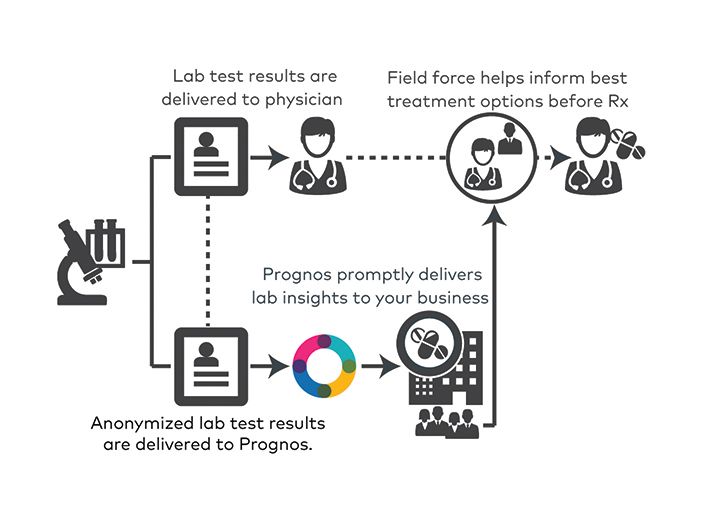Getting to prescribers via the diagnostics route
Big data company gains insights from rapid analysis of lab results
Prognos’ conception of how its data aids pharma marketing

Today’s algorithm-driven, massive-database business-insights firms
are using a variety of approaches to evaluate real-world evidence, identify key opinion leaders or assist physicians in diagnosing patients. Now, a newly renamed firm, Prognos, which has been supported by several pharma-industry backers, is looking to accelerate even this process, so that a pharma rep knows which physicians are treating patients for whom that rep’s products are suitable. The key is Prognos’ access to a claimed registry of five billion clinical records for 100 million patients in more than 30 disease areas. The company has access to the data compiled by two of the industry leaders in lab tests: Quest Diagnostics and LabCorp (among other resources). In practice, as de-identified records of patients’ lab results are compiled, Prognos’ analytics engines parse the data and identify certain disease states, then report this to pharma companies (it is working with 17 currently) in a weekly “Trigger” report. The records can be linked to the physicians ordering them, and reps then have a sense of where to set their priorities for physician visits.
This highly commercial endeavor is the means by which Prognos seeks to (as it modestly puts it) “eradicate disease.” Formerly known as Medivo, the New York-based company has been developing the necessary algorithms for several years, says Sundeep Bhan, Prognos co-founder and CEO. And while the company employs a number of clinical researchers, its main efforts are focused on engineering machine-learning and data-integration techniques; the main power of its tools is in identifying patterns and relationships in datasets. In this regard, Prognos is in the same developmental space as companies like IBM, with its well-publicized Watson “cognitive technology” effort, as IBM calls it.
Bhan says that the company has already demonstrated a doubling of identified patients in a controlled study with a client, and using its tools can have a “significant” ROI on the cost of the service. Along with the disease-state algorithms, it is also developing a proprietary de-identification system to ensure HIPAA compliance with how the diagnostic data are handled.
